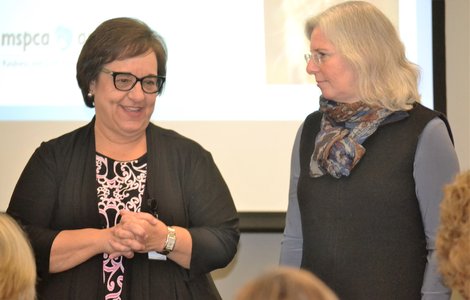
One day they are there, bouncing with energy to greet you, the next you stand silent in front of the door, afraid to turn the knob because you know they are gone.
For many people, the experience of losing a pet is just painful as when a human dies, and those who grieve need to be supported, said Annette Scanlon, G’06, a veterinarian social worker (pictured below at left).
“Losing a pet brings similar, if not the same, levels of grief and loss as losing a human,” she said.
Scanlon and veterinarian Dr. Lisa Moses (pictured below at right) recently presented “Pets and Their People: Veterinary Social Work” at Bridgewater State University as part of the School of Social Work’s Professional Education Programs (PEP).
Veterinary social work is an emerging field and Scanlon is one of just 50 practitioners in the country. Her job is to help both pet owners, caretakers and veterinarians through the difficult process of losing a pet.
“Often times support for the inevitable (death of a pet) is not there,” Scanlon said, adding that veterinarians are often at high risk for compassion fatigue and burn out, and have a greater risk for suicide than the average person.
“They have very little training as to how to deal with human clients,” Scanlon said. “I help support them as well.”
Offering professionals the chance to learn more about such innovative social work is one of the reasons BSU created PEP, said Carol Masshardt, director of Field Education School of Social Work.
“We try to pick up on contemporary issues, we want (the workshops) to be relevant to the work,” Masshardt said.
Suzanne Hecker, assistant director of field education at Simmons School of Social Work, said the information she gathered from the Pets and Their People seminar will be brought back and shared with her students.
“(Veterinary social work) is an innovative field that many are interested in. I have students who have expressed an interest in these different modalities,” Hecker said.
What drew Beacon Hospice social worker Manuel A. Manica to attend Pets and Their People is the ability to participate in-person versus online.
“For me, I prefer to have human interactions. It’s much better and gives you the opportunity to interact, get feedback and network,” he said.
Masshardt thanks Dr. Arnaa Alcon, interim dean of the College of Humanities and Social Sciences; and President Frederick Clark, for their support when the School of Social Work pitched the idea to bring the PEP program to BSU.
“(They) saw the value of professionals turning to BSU for their continued education from day one,” she said.
The next PEP workshop, “Critical and Chronic Medical Conditions: Implications for Social Work Practice,” is scheduled for March 29.
Masshardt encourages professionals to reach out to offer suggestions for future workshops. For more information visit www.bridgew.edu/profdev or email cmasshardt@bridgew.edu. (Photos also by Heather Harris Michonski)
![Vet Talk 2[2].jpg](/sites/bridgew/files/Vet%20Talk%202%5B2%5D.jpg)
